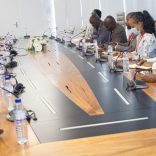Uzbekistan and Mozambique establish diplomatic relations
Mozambique: Voter registration now over 73 per cent – AIM report

Voter registration post in Cuamba Secondary School, Niassa. [Photo: CIP Eleições]
The number of people who have registered to vote in the Mozambican general elections scheduled for 15 October has risen to 73.28 per cent of the target figure of 7.34 million.
According to the latest statistics from the Electoral Administration Technical Secretariat (STAE), between the start of registration, on 15 April, and last Sunday, 26 May, 5,380,161 people registered.
STAE spokesperson Claudio Langa told a Maputo press conference on Tuesday that these figures come from about 95 per cent of the 5,096 registration brigades. The other five per cent had been unable to transmit their data to the provincial or national offices of STAE because of communications difficulties.
To these figures must be added the 6.82 million people who registered last year for the 2018 municipal elections. This means that the total number of voters on the electoral registers now is 12,204,743 – or 86.15 per cent of the estimated potential electorate of 14.17 million.
There are just three days left before registration closes on the evening of 30 May. Langa expected total registration to reach between 90 and 92 per cent of 14.17 million. He said this was comparable with the rates achieved in previous general elections.
There remain significant disparities between the provinces. The southern province of Gaza has registered 94.08 per cent of its 2019 target, closely followed by Cabo Delgado in the far north with 93.23 per cent. This is an impressive figure, since several districts in Cabo Delgado stopped registration for a few days in the wake of cyclone Kenneth, which hit the province on 25 April.
Parts of northern Cabo Delgado have also suffered significant population movements because of the low-level insurgency waged by supposed Islamic fundamentalists.
The third most successful province is Zambezia, which has registered 88.99 per cent of its target.
Right at the bottom of the table come the provinces where registration ought to be easiest – Maputo province and Maputo city, on 55.54 and 51.37 per cent respectively.
When journalists blamed STAE for poor registration rates, Langa pointed to Maputo and the neighbouring city of Matola. If, in the two largest cities in the country, people did not register, in the 46 days available, that was their own decision and had nothing to do with STAE, he said.
At the current rate, it seems that almost half the young residents of the capital who reach the voting age of 18 this year will not bother to register.
Nonetheless, there were some grounds for optimism. Registration had picked up on Sunday in at least some Maputo posts, where the queues were long enough for the posts to remain open way beyond the official closing time of 18.00.
Although there are only 5,096 brigades, there are 7,737 registration posts. Hence many of the brigades, especially in rural areas, are expected to be mobile, covering several posts. Langa insisted that, contrary to claims by some NGOs, all the posts were operational.
There had indeed been cases where the brigades could not reach certain posts on particular days – because the brigade did not have a vehicle, or did not have fuel, or because of logistical difficulties in fording rivers, for instance. In these cases, Langa said, the brigades’ visits to these posts were rescheduled. He denied that any post had been left out.
As for claims of underage voters registering in Gaza, Langa said this had happened with young girls who were carrying babies. They had no identification documents, and used the clause in the law which allows people to register if two voters registered at the same post vouch for their identity, including their age. Would-be voters can also use traditional or religious leaders to vouch for them.
There have also been cases of people registering on multiple occasions. Langa said these fake voters will be weeded out, once the entire electoral register is computerised. The STAE computers should be able to detect duplicate registrations.
Langa also admitted cases of Zimbabwean and Malawian citizens registering as Mozambican voters. He said this happened in the registration posts set up for Mozambicans in the diaspora, and believed the purpose was not for foreigners to vote in Mozambican elections, but for them to take their voter card to the Mozambican embassies in Harare or Lilongwe and attempt to obtain a Mozambican passport. They would then enter Mozambique in search of jobs.
Langa said the Mozambican diplomatic missions in the countries involved were becoming more involved in the registration to halt these abuses.
The current average rate of registration (up to 26 May) is 128,099 voters a day. At this rate, by 30 May, registration will be about 5.9 million – or just over 80 per cent of the target. Add those registered for the municipal elections last year, and the total registration could reach 89.6 per cent of the estimated potential electorate.
Langa categorically ruled out any further extension of the registration period. Such an extension has been requested by both the main opposition parties – the former rebel movement Renamo and the Mozambique Democratic movement (MDM).
The STAE registration figures and percentages for the period 15 April – 26 May are as follows, province by province:
Niassa 256,159 (53.76 per cent)
Cabo Delgado 600,428 (93.23)
Nampula 1,145,799 (67.32)
Zambezia 1,018,587 (88.99)
Tete 503,966 (64.16)
Manica 361,995 (80.02)
Sofala 331,257 (63.47)
Inhambane 314,074 (65.7)
Gaza 541,019 (94.08)
Maputo province 244,897 (55.54)
Maputo city 61,980 (51.37)
Total 5,380,161 (73.28)
As for the diaspora, many more Mozambicans living outside the country have registered than STAE predicted. There are nine countries where the Mozambican community is deemed sufficiently large to hold elections. STAE forecast this diaspora electorate at 117,198, but by Sunday 158,019 (or 134.83 per cent of the target) had registered.
South Africa, which has by far the largest Mozambican migrant community, accounts for most of this. STAE predicted a total Mozambican potential electorate in South Africa of 65,536, but to date 109,519 have registered (167.11 per cent).












Leave a Reply
Be the First to Comment!
You must be logged in to post a comment.
You must be logged in to post a comment.